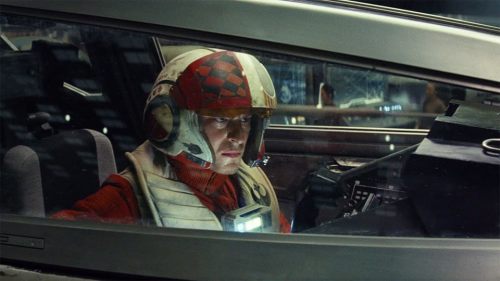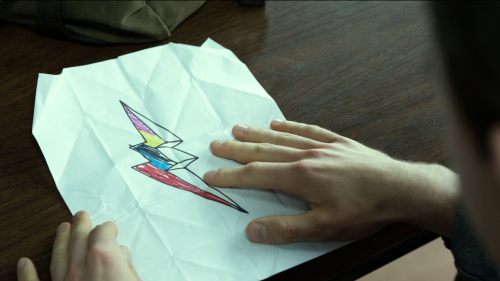Say Something Nice: DEADGIRL (2008)
Movie fans know all too well that you have to wade through a lot of disappointment to find the good stuff. And it’s not always some binary pile-sorting of "good movies" and "bad movies"; sometimes there’s quality material smack in the middle of the muck. Say Something Nice is dedicated to those gems - memorable, standout, even great moments from movies that...well, aren’t. But for Valentine's Day, we're doing something a little different: BMD contributor Noah Segan talks about a film that's quite polarizing - with fans and detractors alike often missing the mark.
“‘Write what you know’ will always be great advice for those who ought not to write at all.” - Gore Vidal
Full disclosure: A couple years after Deadgirl played at Fantastic Fest, I’d become friends with some of the Birth.Movies.Death. (née Badass Digest) crew, and was invited to stay with them for the festival. Our illustrious leader, Meredith Borders, was very anxious about me crashing with them - solely because she’d seen the movie the prior year. But, and I quote her, “How wrong I was! You always make coffee and run the dishwasher!” So, you see, I’m pretty great.
In a few dozen movies over about a dozen years, the film I’ve done that still garners the most ambivalence, that sticks in the most craws, which chaps all the hides, is Deadgirl. Almost a decade after production, some kind of comment, usually hateful or derisive, finds its way to me every couple weeks or so. It’s a challenging film, ahead of the curve with respect to the kind of sophisticated, socially relevant horror films that have become more common in the last few years. It was also an incredible challenge to perform. When we made it, there simply weren’t a lot of these movies, or a cohesive community like there is today. Along with films like Grace and Teeth, it represented what would be a new wave of horror that examined gender dynamics.
Deadgirl is the story of two ne’er-do-well teenage boys (played by me and Shiloh Fernandez) who find a nude, animalistic, invincible young woman (Jenny Spain) chained to a gurney in an abandoned building. The story vacillates between the boy who is drawn to doing the right thing, like helping her, and the kid who wants to do the wrong thing, like repeatedly raping and abusing her. The latter lad is me! It goes downhill from there, and the kid I play pretty much succeeds in doing all the horrible shit you can think of. Thanks to the brilliant Trent Haaga (writer of Cheap Thrills and filmmaker of the upcoming 68 Kill), the high-water marks are the aforementioned atrocities. It gets really, really dark. If you’re a human being with feelings, it can be difficult to watch a lot of those scenes. If you’re not one of those people, take it from me that it can be an incredible challenge to pretend as if you are.
Even as a plucky know-it-all thespian with three or four films under his belt at the ripe old age of 24, I knew playing a genuinely horrible person was going to be a trial. For some reason, I get cast a lot as bad guys, or at least sad guys who do bad things. In real life, I’m very nice! With Trent’s screenplay, I was able to find a lot of humor in the character. If our current political situation isn’t enough of an example, really dangerous people can also do stupid/funny stuff. I had a theory that being able to laugh at this villain would make it easier for people to watch him do these shitty things. And you have to watch. That’s the point. It occurred to me that the burden of the character, and the actor (me) was to ensure that you, the audience, keeps watching. You needed to see the impetus, the purpose and the final result.
When it came time to shoot, I stopped talking to all the women I knew. It was going to be too difficult to work six days a week, 16 hours a day as the worst dude ever and then call my mom on my day off. I asked the directors, Gadi Harel and Marcel Sarmiento, to help me keep distance from Jenny between takes, so she could get a break from me and we wouldn’t develop the kind of friendly rapport all too common on sets. She also needed the space to fully occupy her role, which demanded a degree of mental and physical concentration that most actors can not begin to fathom.
In the years since, and the myriad opportunities to defend the film, I’ve developed a belief about what Deadgirl is truly about. It serves as a coping mechanism, mostly, as well as a testament to what a lot of us have been talking about recently. It’s a film about toxic masculinity. It is a diatribe on the systematic failure to teach young men how to function properly. In its latent homoeroticism (trust me), the two boys channel all their confusion, inability to communicate, love, or develop consciences, into the worst acts men can commit. It’s all done against the canvas of the Deadgirl. She’s the moral compass, the martyr. Just because the boys can’t see that doesn’t mean the audience shouldn’t.
Spoilers: At the end of the film, when my character beseeches Shiloh’s to join him in creating an additional Deadgirl, we get a clear look at just where these boys are coming from. While Shiloh’s Ricky dons his best white knight armor, he can’t fathom what he did to get Candice Accola’s Joanne there. My character, J.T., projects all his insecurities onto Ricky, suggesting that being a decent person, or at least not the “alpha,” is the real sign of weakness. The irony, of course, is that all this posturing, all this work to establish who is in charge, is set against the dehumanization of one woman and the potential to do the same to another.
Deadgirl Scene from BMD Phil on Vimeo.
Talking with folks about Deadgirl is a favorite pastime of mine. Maybe it’s my own maturity, or a blossoming progressiveness in the zeitgeist, but only recently have I been able to articulate my intent, and what I believe the goal of the entire film is. (It’s nice to have the vocabulary now to describe where we were coming from!) For years I’ve dealt with a lot of guys who think this is a glorification of misogyny, or folks who think it’s a send-up of masculine comeuppance. It is neither. Deadgirl is a tragedy about losing our humanity through our expectations of manhood, and at the expense of empathy.



_500_281_81_s_c1.jpg)